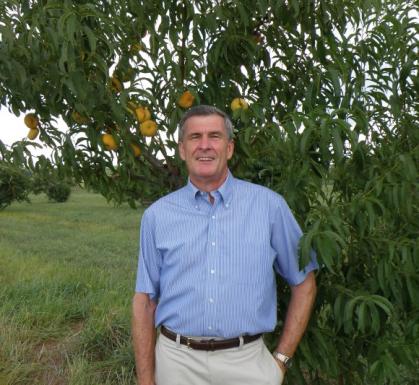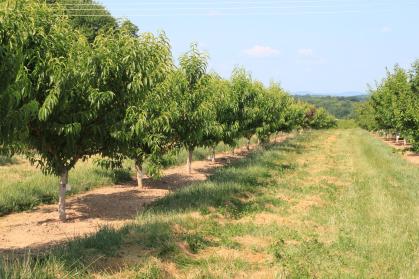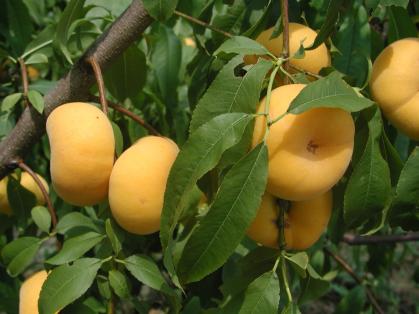Rutgers Tree Fruit History
Rutgers Tree Fruit History
The tree fruit breeding program at Rutgers New Jersey Agricultural Experiment Station began in 1907, introducing varieties bred for their superior eating quality, winter-hardiness, and disease resistance that are well known in the tree fruit industry. Breeder Joseph Goffreda, who has patents for apples, apricots, peaches and nectarines, has led the Rutgers tree fruit breeding program since 1989. Dr. Goffreda’s dedication to tree fruit breeding has been instrumental in sustaining the tree fruit industry of the Northeast.

Dr. Joseph Goffreda has dedicated nearly three decades of research to the Rutgers New Jersey Agricultural Experiment Station tree fruit breeding program. He received an “Inventor of the Year” award in 2015 from the NJ Inventors Hall of Fame for breeding ‘NJF16,’ a peach variety marketed under the name TangOs®. This hybrid variety is known for being sweet, flat-shaped, and 100% yellow. Tree fruit growers prefer it because its non-melting flesh makes it safer to transport. Dr. Goffreda’s dedication to tree fruit breeding has been instrumental in sustaining the tree fruit industry in the Northeast. As changes in climate introduce new threats, selecting for resistance to frost and new pests will help trees adapt and continue producing delicious fruits. Dr. Goffreda and other members of the the Rutgers tree fruit breeding program in Cream Ridge, New Jersey, conduct research to develop new high-quality varieties of apple, apricot, nectarine, plum, and peach trees. The center increases production efficiency and protects fruit crops against environmental and biological hazards, while decreasing production costs and pesticide use.
Tree Fruit Research
The tree fruit breeding program conducts and disperses research applicable to the production of high-quality tree and small fruits, including apples, peaches, apricots, nectarines, brambles, strawberries, and ornamental nursery crops. The program aims to increase production efficiency and protect fruit crops against environmental and biological hazards, while decreasing production costs and pesticide use.
Note: Only traditional breeding techniques are used, such as cross-pollination.

Bacterial Spot
Rutgers researchers breed peaches with tolerance to major diseases, such as bacterial spot. Bacterial spot is difficult to control and typically requires the use of antibiotics and copper. Many commercial varieties of peaches have been developed in parts of the country where there is low disease pressure. However, since New Jersey’s climate can be favorable to disease development, tree fruit specialists such as Dr. Goffreda sought out to develop cultivars more suitable for production in the Northeast and Mid-Atlantic regions. Other factors considered in the breeding and selection process include tolerance to other major diseases, cold-hardy flower buds, and fruit eating quality.
Apple Scab
Seasonal shifts concern tree fruit yields because of the introduction of diseases and the movement of pests along with warmer temperatures, in addition to early bloom and frost vulnerability associated with season creep. Breeding for resistance is crucially important to prepare farmers for the introduction of new threats brought on by climate change. The PRI disease resistant apple breeding program is cooperative among Purdue University, Rutgers, The State University of New Jersey, and the University of Illinois. The program was initiated in 1945 to breed apples resistant to scab caused by the fungal pathogen Venturia inaequalis.
Integrated Pest Management

There are a number of reasons why tree fruit breeding is essential to prepare tree fruits for the introduction of pests and diseases. Integrated Pest Management (IPM) helps tree fruit growers with the threat of intensified pest invasions by educating farmers about selecting resistance varieties and taking measures to reduce pesticide use. Breeding is needed to produce disease resistance in fruit trees and tackle associated issues, such as proper drainage, air flow, and other ways to overcome climate changes with regard to soils, storm water, and humidity. Rutgers Cooperative Extension provides education and outreach for techniques to reduce frost damage, increase use of IPM, expanding irrigation, and experimenting with new varieties.
